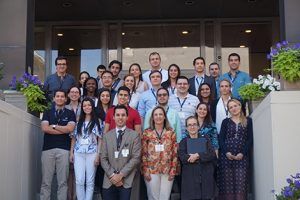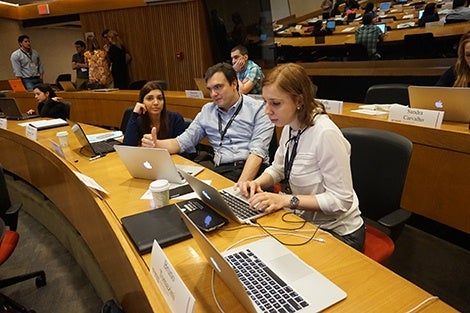October 17, 2016—When Brazilian physician Felipe Fregni, MPH ’07, came to Harvard to study clinical research (medical studies involving human volunteers) the experience was transformative. Gaining the skills to critically analyze the latest research on treatments and preventive measures made him better able to care for his patients, he said, and also launched him into a research career conducting his own clinical trials.
Recognizing that this kind of training was unavailable to many health professionals, particularly in the developing world, Fregni decided to launch the online course Principles and Practice of Clinical Research (PPCR) nine years ago. It is currently offered by Harvard T.H. Chan School of Public Health, and to date, more than 2,000 students from 30 countries have enrolled.
Fregni, an associate professor of neurology at Harvard Medical School, is the director of a large clinical research laboratory at Spaulding Rehabilitation Hospital in Boston focused on investigating how the brain changes with lesions to the nervous system and how to enhance learning when the nervous system is injured. In addition to leading PPCR, Fregni collaborates with researchers in Brazil and other countries.
“The only way you can improve how medicine is practiced is by spreading knowledge,” he said. “I believe that better training of clinical researchers worldwide will help to develop innovations in medicine and public health.”
PPCR is aimed at students with a graduate or health care professional degree who have little or no training in clinical trials. By the end of the course, students will be able to design and conduct their own clinical trials, and understand the basics of article publication, Fregni said.
Fregni takes an interactive approach to keep distance learners engaged during the nine-month certificate course—which he noted has a very low dropout rate of less than 5%. Unlike many such courses, students actively participate in a live online classroom with fellow learners from around the world.
Students gather at 30 course centers in countries including Brazil, Germany, and Russia each week for lectures and group discussions on the basics of clinical research, from formulating a research question and selecting a study population, to data collection and statistical methods. Prior to each session, students participate in online forums and chats with teaching assistants. The course culminates in a group project in which students design a clinical research study that they must submit in a mock grant application and pitch to their classmates and faculty.

There are also several optional in-person workshops during the course: Two-day sessions in Boston focus on skills including statistics and academic writing, and a five-day immersion workshop in Brazil gives students the opportunity to work with Harvard Chan School faculty and others to hone their research ideas. A thriving online alumni community encourages students to continue to learn from each other and collaborate on research projects.
Colombian physician Lina Goez, SM ’13, who earned her degree at Harvard Chan School in epidemiology, said that engaging in discussions and pitching her ideas in this global classroom has helped her become a better researcher and communicator. After taking the course, she joined the training team at the pharmaceutical company where she works, and now helps to tutor new employees in the essentials of clinical research.
Mariana Urquiaga, a research fellow in gastroenterology at Beth Israel Deaconess Medical Center in Boston, said that the course exceeded her expectations. While she signed up hoping to improve her skills in statistics, she left feeling greater confidence in her knowledge of what it takes to have a research career, she said. The communication skills she gained from presenting her work in the class helped prepare her to present research findings from her fellowship on celiac disease at a major conference this month.
Learn more
What will students learn from this course?
Felipe Fregni
How do you engage online learners?
Felipe Fregni
What was it like to take this course online?
Lina Goez
What was something particularly helpful that you learned?
Mariana Urquiaga
Videos: Craig LaPlante
Photos courtesy of Principles and Practice of Clinical Research
